|
Dolce far niente
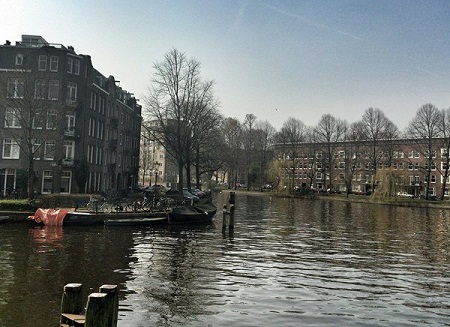
Amsterdam, Kostverlorenvaart
Kleine vooruitzichten 4
Ik fiets nog altijd naar huis.
Langs de Kostverlorenvaart zie ik
het schip Ambitie varen. Diepliggend,
als gevuld met slap zand.
De gangboorden maken veel water.
Zijdelings weggewerkt, terug in de gracht.
Rondpompen is het devies. Niks geen verlies.
Minder is later. En later weer minder.
Ik dacht aan Jan Kostwinder,
die ons kort geleden heeft verlaten.
Hij hield tenminste echt van veel praten.
Veel van echt praten.
Het onstuitbare praten
dat de eenzame doet. Hij wil niet, hij moet.
Ik niet, ik niet, dat zeg ik. Ik groei een baard.
Dat ziet. Men moet zich nuttig maken.
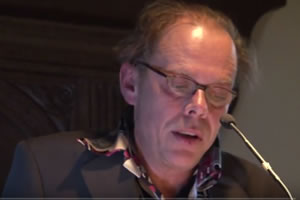
F. Starik (Apeldoorn, 1 juli 1958)
De Ierse dichter Michael Longley werd geboren op 27 juli 1939 in Belfast. Zie ook alle tags voor Michael Longley op dit blog en ook mijn blog van 27 juli 2010.
THE QUILT
For Peggy O’Brien
I come here in the dark, I shall leave here in the dark-
No time to look around Amherst and your little house,
To talk of your ill father, my daughter’s broken-no,
There isn’t time-tears in the quilt, patterns repeating.
And yet as antique orphan and girlish granny we
Stitch a square of colour on the darkness, needle-
Work, material and words, Emily’s bedroom window
With a bowl of flowers we pick out through the glass.
The old iron bed you brought over from Tralee fills up
The box-room where I snooze, as though I have become
For these few hours in February your father, your son,
While in your neighbourhood instead of snow the bushes
Wear quilts left out all night to dry, like one enormous
Patchwork spring-cleaned, well-aired, mended by morning.
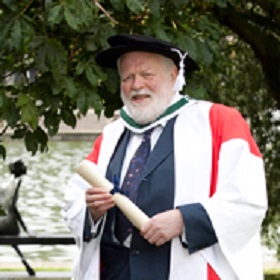
Michael Longley (Belfast, 27 juli 1939)
De Amerikaanse schrijver Theodore Herman Albert Dreiser werd geboren op 27 juli 1871 in Sullivan, Indiana. Zie ook alle tags voor Theodore Dreiser op dit blog en ook mijn blog van 27 juli 2010.
Uit: An American Tragedy
“The man — the father, as he chanced to be — looked about him with seeming wide- eyed assurance, and announced, without appearing to care whether he had any auditors or not:
“We will first sing a hymn of praise, so that any who may wish to acknowledge the Lord may join us. Will you oblige, Hester?”
At this the eldest girl, who until now had attempted to appear as unconscious and unaffected as possible, bestowed her rather slim and as yet undeveloped figure upon the camp chair and turned the leaves of the hymn book, pumping the organ while her mother observed:
“I should think it might be nice to sing twenty-seven tonight —‘How Sweet the Balm of Jesus’ Love.’”
By this time various homeward-bound individuals of diverse grades and walks of life, noticing the small group disposing itself in this fashion, hesitated for a moment to eye them askance or paused to ascertain the character of their work. This hesitancy, construed by the man apparently to constitute attention, however mobile, was seized upon by him and he began addressing them as though they were specifically here to hear him.
“Let us all sing twenty-seven, then —‘How Sweet the Balm of Jesus’ Love.’”
At this the young girl began to interpret the melody upon the organ, emitting a thin though correct strain, at the same time joining her rather high soprano with that of her mother, together with the rather dubious baritone of the father. The other children piped weakly along, the boy and girl having taken hymn books from the small pile stacked upon the organ. As they sang, this nondescript and indifferent street audience gazed, held by the peculiarity of such an unimportant-looking family publicly raising its collective voice against the vast skepticism and apathy of life. Some were interested or moved sympathetically by the rather tame and inadequate figure of the girl at the organ, others by the impractical and materially inefficient texture of the father, whose weak blue eyes and rather flabby but poorly-clothed figure bespoke more of failure than anything else.”
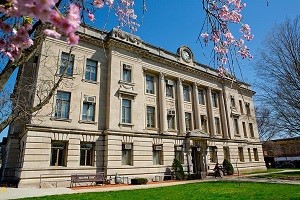
Theodore Dreiser (27 juli 1871 – 28 december 1945)
Sullivan, Indiana, Courthouse
Onafhankelijk van geboortedata
De Nieuw-Zeelandse schrijver Graeme C. Simsion werd geboren in in Auckland, Australië, in 1956. Zie ook alle tags voor Graeme C. Simsion op dit blog.
Uit: The Rosie Project
“Claudia had introduced me to one of her many friends. Elizabeth was a highly intelligent computer scientist, with a vision problem that had been corrected with glasses. I mention the glasses because Claudia showed me a photograph, and asked me if I was okay with them. An incredible question! From a psychologist! In evaluating Elizabeth’s suitability as a potential partner—someone to provide intellectual stimulation, to share activities with, perhaps even to breed with—Claudia’s first concern was my reaction to her choice of glasses frames, which was probably not even her own but the result of advice from an optometrist. This is the world I have to live in. Then Claudia told me, as though it was a problem: ‘She has very firm ideas.’
‘Are they evidence-based?’
‘I guess so,’ Claudia said.
Perfect. She could have been describing me.
We met at a Thai restaurant. Restaurants are minefields for the socially inept, and I was nervous as always in these situations. But we got off to an excellent start when we both arrived at exactly 7.00 p.m. as arranged. Poor synchronisation is a huge waste of time. We survived the meal without her criticising me for any social errors. It is difficult to conduct a conversation while wondering whether you are looking at the correct body part but I locked on to her bespectacled eyes, as recommended by Gene. This resulted in some inaccuracy in the eating process, which she did not seem to notice. On the contrary, we had a highly productive discussion about simulation algorithms. She was so interesting! I could already see the possibility of a permanent relationship.
The waiter brought the dessert menus and Elizabeth said, ‘I don’t like Asian desserts.’
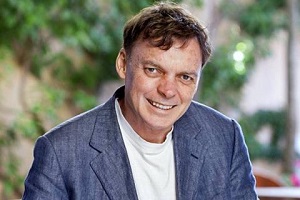
Graeme C. Simsion (Auckland in 1956)
Zie voor de schrijvers van de 27e juli ook mijn blog van 27 juli 2015 en ook mijn blog van 27 juli 2011 deel 1 en eveneens deel 2.
27-07-2016 om 15:40
geschreven door Romenu 
Tags:Dolce far niente, F. Starik, Michael Longley, Theodore Dreiser, Graeme C. Simsion, Romenu
|

